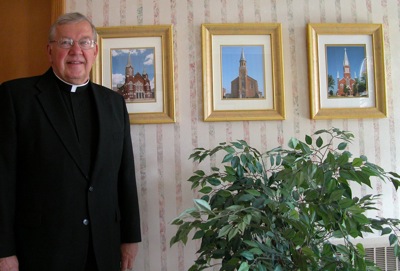Friday, June 22nd, 2007
First step - learn if area farmers would join water quality program
By Nancy Allen
Local officials Thursday held their first meeting to investigate establishing a federal program to improve water quality in the Grand Lake/Wabash River Watershed.
But leaders must first find out if local farmers want the program before they begin the estimated one- to two-year planning required to get a USDA Conservation Reserve Enhancement Program (CREP) for the watersheds.
"You need to poll landowners," said Jeff Mitchell, chief of the Ohio Farm Service Agency's conservation section. "If they're not interested, you don't need to go very far."
A small group of local, state and federal officials sat through the almost two-hour meeting, including those from county soil and water conservation district offices. SWCD technicians would be on the front line of implementing conservation practices in any CREP program and local county Farm Service Agency offices would administer the funding for the program.
The USDA's CREP program pays landowners to take farmland out of agricultural production and install grass-covered filter strips, plant trees and install other conservation practices. All of the conservation practices available through CREP are meant to lessen soil erosion and improve water quality.
CREP landowners are paid annual rental rates based on county established soil rental rates for a maximum 15-year contract. CREP has been authorized through United States Farm Bills since 1985 and is the biggest federal conservation program in the nation.
Local participation in the existing Lake Erie CREP program, which includes just the Grand Lake portion of the watershed, has been lackluster in the livestock-intensive watershed. This is because the cost of farmground and cash rent prices are so high that CREP is left unable to compete, said Chris Gibbs, executive director of the Mercer County Farm Service Agency.
Local officials who want a CREP agreement for the Grand Lake/Wabash Watershed generally agree infusing the program with more money may be the only way to encourage landowners to participate.
Any CREP agreement would need to be tailored to the specific needs of the Grand Lake/Wabash Watershed and community input is an absolute necessity, officials said.
Theresa Dirksen, coordinator of the Grand Lake/Wabash Watershed Alliance, initiated looking into a special CREP for the watershed area due to its water quality problems.
Challenges in the local watersheds include direct manure runoff, farmland saturated with phosphorous after years of manure application, poor manure management, and lack of filter strips along creeks, buffer areas and grass waterways in areas of gully erosion. Other challenges include the digging out and straightening of streams which destabilize them and the lack of trees over streams to hold banks in place and lessen soil erosion.
Gibbs said getting farmers to implement no-till or conservation tillage and planting techniques would do a lot to improve water quality.
"We really need to focus on sedimentation and erosion and that's why CREP is helpful," he said.
A cursory look at farmland in the watershed area showed that about 71 percent of the agricultural land is conventionally tilled, 15 to 18 percent is no-tilled or conservation tilled and 14 percent is used to grow hay or for pasture, Dirksen said.
The Grand Lake/Wabash Watershed has been deemed one of the most impaired in the state based on water quality testing done by the Ohio EPA. The data shows that the majority of the pollutants come from soil and nutrients that run off from farmland, which makes up more than 90 percent of the acreage in the watershed area. Nearly all water samples exceeded Total Maximum Daily Load requirement levels. The Ohio EPA tested for total phosphorous, nitrates, suspended solids and fecal coliform levels.
The USDA currently has agreements with the state of Ohio for three CREP programs in the Ohio Upper Big Walnut Creek, Sciota River and Lake Erie watersheds.
Twenty percent of the funding to have a special CREP for the Grand Lake/Wabash watershed would have to come from local sources and 10 percent of that must be cash, said Rob Hamilton, of the Ohio Department of Natural Resources Division of Soil and Water Conservation. The remainder would be funded by USDA. Hamilton also said individual counties may have to come up with more funding to implement a CREP. State money would be available for technical assistance for SWCDs to implement CREP practices.
No proposal to pursue a CREP agreement with USDA for the local watersheds was posed Thursday, but local officials plan to discuss the topic more.

